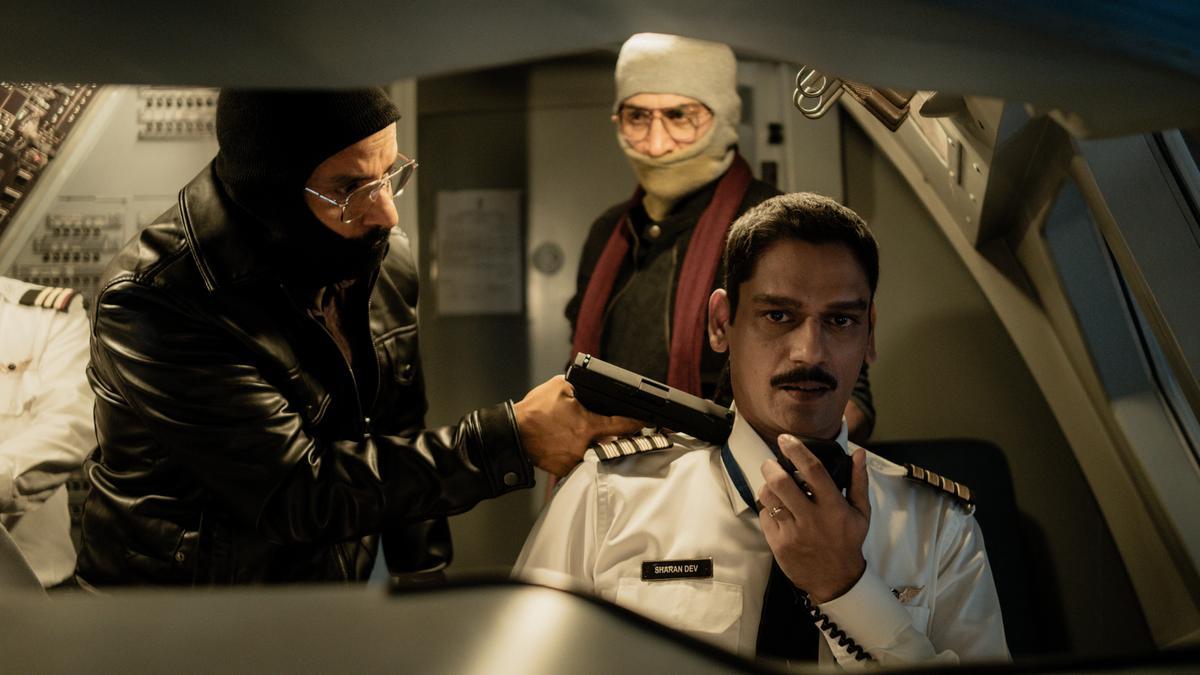
Netflix’s latest web series, “IC 814: The Kandahar Hijack,” directed by Anubhav Sinha, has found itself embroiled in a significant controversy this week. The series, which has garnered critical acclaim for its unflinching portrayal of the harrowing hijack of Indian Airlines Flight IC 814 in December 1999, has incited public outrage over the depiction of hijacker identities.
The uproar began when social media users took offense at the names assigned to some of the hijackers in the series. While the show is touted for its dramatic depiction and nail-biting narrative, it’s the choice of names—’Bhola’ and ‘Shankar’, used for two of the hijackers—that has elicited a vehement response. Critics argue that these names distort the religious identities of the terrorists involved in the real-life incident.
In a swift reaction to the outcry, the Information & Broadcasting Ministry summoned Monika Shergill, the content chief of Netflix India. The ministry sought explanations regarding the creative decisions behind the character names, reflecting the gravity of the allegations that the series may have misrepresented historical events. Additionally, a public interest litigation (PIL) has been filed in the Delhi High Court by Vishnu Gupta, the president of the right-wing outfit ‘Hindu Sena’. The PIL questions the underlying motives behind using Hindu names for the hijackers, alleging that it misleads the audience about the true religious affiliations of the terrorists.
The six-episode series revisits the fateful day of December 24, 1999, when Flight IC 814 was hijacked shortly after departing from Kathmandu bound for Delhi. The crisis saw the Airbus 300 being diverted to several locations, including Amritsar, Lahore, and Dubai, before it finally landed in Kandahar, Afghanistan, then under Taliban rule. The gripping narrative captures the harrowing ordeal that unfolded over six days, culminating in the Indian government’s release of three notorious terrorists—Masood Azhar, Omar Saeed Sheikh, and Mushtaq Ahmad Zargar—in exchange for the safe return of the hostages.
“IC 814: The Kandahar Hijack” draws inspiration from “Flight To Fear,” a first-hand account co-authored by the aircraft’s captain, Devi Sharan, and journalist Srinjoy Chowdhury. Despite a disclaimer stating that the series is a work of fiction inspired by real-life events, the controversy centers on the perceived implications of the fictionalized elements. Specifically, it stems from the creative liberties taken by the show’s writers in their portrayal of the hijackers’ names.
Historical accounts from media sources and a press release by the Union Home Ministry on January 6, 2000, confirm that the hijackers used aliases during the hijack.
. The officially disclosed names of the hijackers are Ibrahim Athar, Shahid Akhtar Sayeed, Sunny Ahmed Qazi, Mistri Zahoor Ibrahim, and Shakir. According to the press release, the hijackers addressed each other using the aliases Chief, Doctor, Burger, Bhola, and Shankar. This element of using codenames has seemingly not been explicitly communicated in the series, leading to the misunderstanding and subsequent uproar.
Those voicing their concerns argue that the lack of explicit clarification might mislead future audiences who may not be well-versed in the historical details of the incident. This viewpoint was echoed by BJP leader Amit Malviya, who emphasized in a tweet that the creative decisions in the series could lead to significant historical misconceptions. “The hijackers of IC-814 were dreaded terrorists who acquired aliases to hide their Muslim identities. Filmmaker Anubhav Sinha legitimized their criminal intent by furthering their non-Muslim names. Result? Decades later, people will think Hindus hijacked IC-814,” wrote Malviya on social media platform X, formerly known as Twitter.
The narrative of “IC 814: The Kandahar Hijack” indeed dramatises the intense negotiations between the Indian government and the hijackers. While the show does unmask Chief, revealing him to be Ibrahim Athar, the brother of Masood Azhar, it only briefly touches on the fact that ‘Bhola’ and ‘Shankar’ were codenames, referred to as such only once throughout the series. Journalist Neelesh Misra, who authored a book on the IC-814 incident, also corroborated this by identifying Chief as the brother of Masood Azhar in his social media posts.
The controversy has sparked a debate on the responsibilities of filmmakers when portraying true events, especially those involving sensitive historical incidents. As the PIL awaits a hearing in the Delhi High Court, Netflix and the series creators find themselves at the center of a storm, facing scrutiny from both political figures and the public at large.
The complexity of such narratives, which straddle the thin line between artistic freedom and historical accuracy, continues to prompt discussions on how real-life events should be dramatized for the screen. The outcome of these debates and the court’s decision could potentially set a precedent for future film and web series productions in India.












